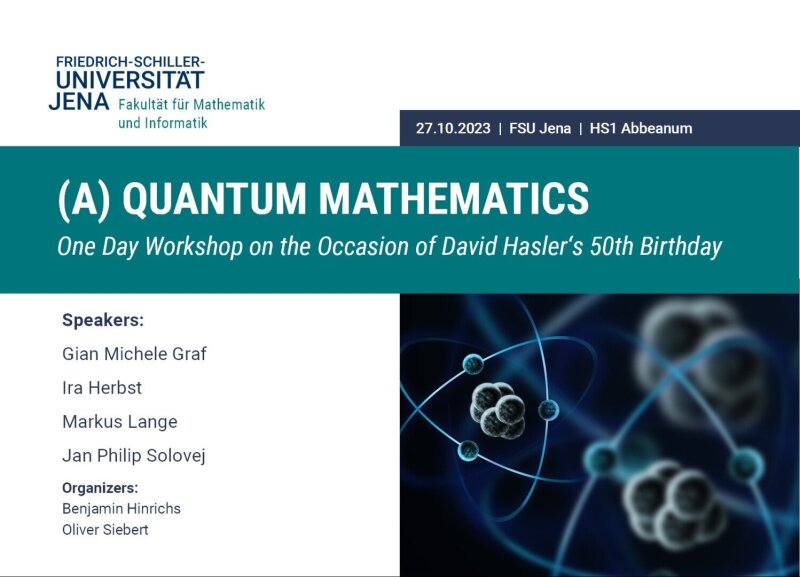(A) Quantum Mathematics
-
General Information & Registration
The workshop will take place in hybrid format. If you plan to participate in this workshop, please send a short e-mail to Benjamin Hinrichs. Please indicate whether you want to participate in person or online and whether you want to participate in the conference dinner (details below). If you participate online, then you will receive login credentials a few days before the workshop.
-
Schedule
14.00 - 14.50 Gian Michele Graf
Infrared scattering states in the massless Nelson model14.55 - 15.45 Markus Lange
Degenerate Perturbation Theory for Models of Quantum Field Theory with SymmetriesCoffee Break
16.15 - 17.05 Jan Philip Solovej (Online)
A model for periodicity of atomic structure17.10 - 18.00 Wolfgang Spitzer
Spectral gap condition for type-I Bose-Einstein condensation in random potentials18.30 Conference Dinner @ Papiermühle
-
Abstracts
Gian Michele Graf, ETH Zurich
Infrared scattering states in the massless Nelson model
The Nelson model describes a particle coupled to a (bosonic) field. In the case where the field is massless, the model is a simple caricature of QED, as both theories share some traits in the infrared, and in particular the difficulty of defining scattering states. A possible solution, to be discussed, is that the particle emits an ever growing number of ever softer bosons. A precise and asymptotically (in time) exact description of the process will be given, motivated, and compared to earlier work by others.
Markus Lange, DLR St. Augustin & Ulm
Degenerate Perturbation Theory for Models of Quantum Field Theory with Symmetries
Joint with David Hasler
We consider Hamiltonians of models describing non-relativistic quantum mechanical matter coupled to a relativistic field of bosons. If the free Hamiltonian has an eigenvalue, we show that this eigenvalue persists also for nonzero coupling. The eigenvalue of the free Hamiltonian may be degenerate provided there exists a symmetry group acting irreducibly on the eigenspace. Furthermore, if the Hamiltonian depends analytically on external parameters then so does the eigenvalue and eigenvector. Our result applies to the ground state as well as resonance states. For our results, we assume a mild infrared condition. The proof is based on operator theoretic renormalization.Jan Philip Solovej
A model for periodicity of atomic structure
Despite its name the periodic table of the elements is not particularly periodic. It does nevertheless have the feature that that elements in the same group have similar chemical properties. For eample the nobel gases He, Ne, Ar, Kr, … all have very weak chemical reactions. But if we imagine extending the periodic table to very large atomic number Z how would we predict which atoms are noble gases. The chemist have the somewhat phenomenological Aufbau Principle. In this talk I will consider the model where an atom with atomic number Z is described by the one-particle Schrödinger operator with the corresponding Thomas-Fermi potential. This is the Z dependent potential that is known to approximate, using semiclassical analysis, the interaction an electron feels on average (mean field) from all the other electrons. We prove that for a sequence of atomic numbers Zn tending to infinity these Thomas-Fermi mean field Schrödinger operators converge in strong resolvent sense if and only if CZn1/3 tends to a value θ mod π for some explicit constant C. This shows that in this model atoms corresponding to such sequences in the limit have identical properties and that there is a certain periodicity. The Aufbau Principle would predict a similar result but with a different constant C. The result is based on a detailed WKB analysis. This is joint work with my Phd student August Bjerg.
Wolfgang Spitzer, FernUniversität Hagen
Spectral gap condition for type-I Bose-Einstein condensation in random potentials
We discuss Bose-Einstein condensation (BEC) in systems of non-interacting bosons in random potentials in d dimensions, d∈{1,2,...,}. Working in a rather general framework, we provide a "gap condition" which is sufficient to conclude existence of so-called type-I BEC in probability and in the mean. We illustrate our results in the context of the well-known (one-dimensional) Luttinger-Sy model. Here, whenever the particle density exceeds a critical value, we show that only the ground state is macroscopically occupied. Recently, Alain-Sol Sznitman proved our gap condition for the higher dimensional version of this model studied first by Kac and Luttinger. Altogether, this resolves affirmatively a conjecture by Kac and Luttinger from 1973. This is joint work with Joachim Kerner and Maximilian Pechmann.
-
Local Information
The workshop venue is Abbeanum, Lecture Hall 1 (address: Fröbelstieg 1, 07743 Jena).
The workshop dinner will take place at Braugasthof PapiermühleExternal link.
In case you need assistance finding accomodation, please contact one of the organizers.
